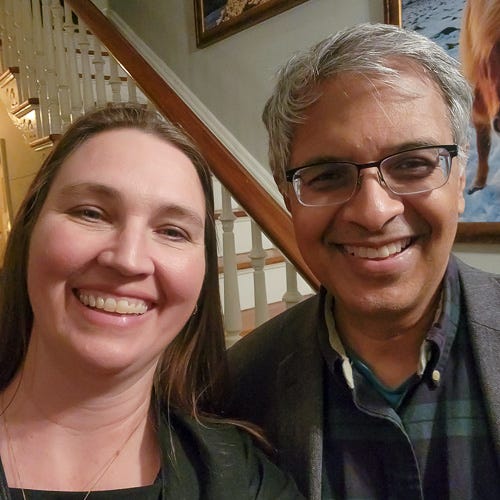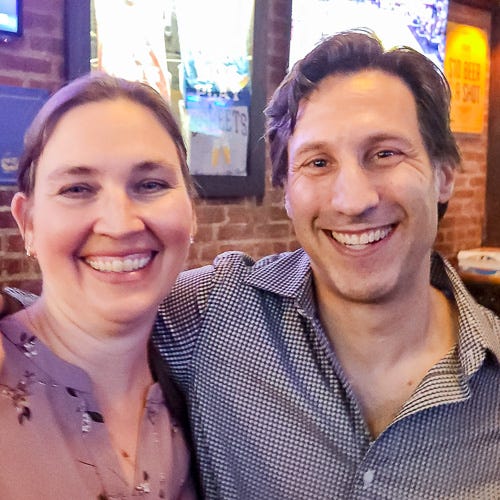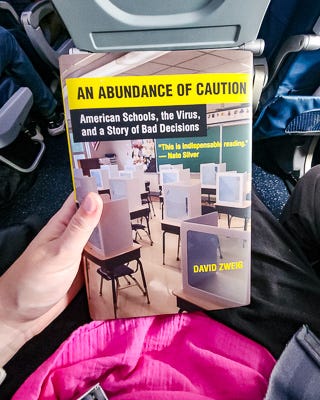My Reflections on Covid After Five Years
Some signs of hope in 2025
Last week, I shared a Substack article by Karol Markowicz titled, “I Don’t Want to Be Writing About Covid in 2025,” because I thought she did a great job explaining why we’re still talking about Covid restrictions, five years later. She also included an especially good timeline of Fauci’s ever-changing stance on masks. The shifting positions during Covid become starkly obvious when laid out like this. Two of my most popular Substack articles are timelines that similarly walk through the changes over time in government messaging about Covid vaccine effectiveness and post-vax myocarditis in young men.
There was also the infamous flip-flop on school reopening when the American Academy of Pediatrics (AAP) announced their strong support for reopening, only to reverse their position within a span of two weeks. All it took was Trump’s vocal push to reopen schools for the AAP and the teachers’ unions to circle the wagons and issue a joint statement that said “substantial new investments” would be required in order to reopen “safely” and that we should “listen to educators and administrators” about how to reopen schools.

School reopening instantly became a political lightning rod, with many experts driven more by ideology and groupthink than by what was best for children. The public health and medical experts failed us, and so did the media. Government messaging and news articles focused on the fears of school reopening, warning that children could get very sick or spread Covid to teachers and vulnerable relatives. Many of these articles included unsupported claims and inaccurate or misleading statistics, but they were very effective at scaring parents, teachers, and school and government officials. It took a long time for the truth to get through to a lot of people about how badly they were misled about our Covid response, especially regarding schools.
Over the past five years, I’ve repeatedly corrected the CDC, other government institutions, journalists, and Twitter doctors about their claims. I’ve sent many emails to academics, news editors, and government agencies to clarify data and ask for corrections. Unfortunately, people and organizations often stand by their incorrect statements, and when they do issue a correction, it’s typically seen by only a limited number of people. That’s a big part of what this Substack has been for — breaking down and sharing the truth about misleading studies, news articles, and government data.
But I have hope that the American public is becoming more aware of the realities of our flawed Covid response and the institutions that contributed to it. Books like In Covid's Wake: How Our Politics Failed Us by Frances E. Lee and Stephen Macedo and An Abundance of Caution: American Schools, the Virus, and a Story of Bad Decisions by David Zweig document some of the ways we were failed by scientists, politicians, and the media. Both books have received fairly widespread media coverage, and many people are now in agreement that much of our Covid response was heavy-handed and illogical. Our Covid mitigations did little to “slow the spread,” while causing significant harm to our children, the economy, and society as a whole.
Over the past five years, I’ve had the pleasure of meeting several of the people I’ve connected with on Twitter. I hosted a couple of gatherings with Matt Shapiro ofMatt Shapiro's Marginally Compelling for local Atlanta Georgia friends. And some of us met Dr. Vinay Prasad (recently tapped to lead the FDA’s CBER) when he came to Atlanta for a discussion with Carlos del Rio in 2024. Then last month, I had the pleasure of meeting many of my “Team Reality” Twitter friends at a party in Washington, D.C. to celebrate Dr. Jay Bhattacharya’s confirmation as NIH Director. Two weeks later, I enjoyed meeting several more people at David Zweig’s book launch event in New York City.


Meeting so many of my Covid heroes and Twitter friends was such a fun way to cap off five years of analyzing data and tweeting and writing about Covid from my home in Atlanta. After years of sharing studies and news articles, comparing notes, and answering questions on data and policy, it was nice to meet so many of these virtual friends in person, at a time when our ideas are finally seen as less “fringe” than they once were. In many ways, the five-year anniversary of Covid has felt like a turning point in the Covid discourse, where it’s now acceptable for mainstream people to acknowledge at least some of the excesses of our Covid response.
I received David’s book shortly before heading to New York City and started reading it on the plane. I plan to do a full review of it once I’m done, but so far, it feels like the exact book I would have written about Covid. I first came across David after reading his May 2020 article, The Case for Reopening Schools. I eventually got in touch with him, and we communicated many times in the years following, and it’s clear we are very much of the same mind about Covid.
One of the very first things I learned about Covid was that it had a strong age gradient, with school-age children at the lowest risk. As a mother, that was what mattered most to me, and I was thrilled. I never imagined I’d spend years arguing about that good news with people who were determined to keep parents afraid. I am so thankful we have his book to document what happened, and I hope people learn from the many ways things went wrong.
Public health, journalists, and the “expert class” in general lost a ton of credibility over the way they handled Covid. A lot of people who trusted these institutions in the past have been sorely disappointed. I spent the past five years begging the CDC and others in public health to do a better job of honestly and accurately communicating with the public. I’d love to see that actually happen.
Note: I paused subscription charges on this Substack about a year ago, and I am keeping them paused indefinitely, as I’m writing a lot less frequently than I used to. If anything changes, I will contact subscribers before resuming charges. If you aren’t already a subscriber, but want to be notified of any of my future pieces, I encourage you to subscribe for free.






Thank you for your indefatigable efforts over the last five years. You are among a small group of people whose goal was to use an inquiring mind and tell the truth. I am reading David Zweig's book and have to put it down often because the sorrow and anger at how American citizens were treated. The Public Health establishment, uncompassionate and unscientific, with the enabling unquestioning media drove the narrative everyday with fear and anxiety. Brian Kemp, Ron DeSantis and Sweden were without question the leaders in showing that Public Health's last concern was the health of the public. Even my own supposed red state of Alabama is still being lead by Scott Harris who has not lost power but has gained power. He assumed the position of President of the Association of State and Territorial Health Officials last fall proclaiming the importance of trust and transparency. He remains unrepentant and unaccountable because of our feckless legislature. Alabama public health, which is dismal, is entirely controlled by doctors with no political accountability. I am glad that Dr. Jay Bhattacharya is head of NIH and Dr. Vinay Prasad will be at the FDA.
Thank you for this and your other work. I reread your timelines on the experts claims about effectiveness of vaccines and post vaccination myocarditis. It’s great work. But as I read it it pulled me back to a time when I regularly followed the medical literature that drew different evidence based conclusions from the department of public health I was working in. Failure to block transmission was a hill I died on. No argument was winnable with the experts. That’s when I quit public health work. The damage done by withholding, lying, ignoring and enforcing is prevalent today with trust in health agencies in the toilet and vaccination rates for other infectious diseases below rates needed to prevent endemicity. I get a knot in my stomach whenever I think back to that time when evidence based decisions were ignored.